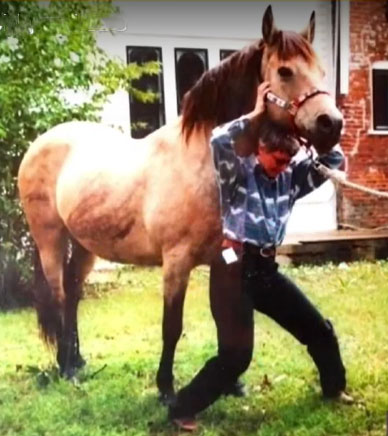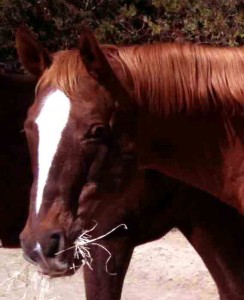March 2021
Does Your Horse Know What is Good For Him?
Holistic Horsekeeping
How to have a healthy happy horse.
Volume 26, Number 3
=*=*=*=*=*=*=*=*=*=*=*=*=*=*=*=*
In This Issue:
1. Does Your Horse Know What is Good For Him?
2. Learn at Home
=*=*=*=*=*=*=*=*=*=*=*=*=*=*=*=*
1. Does Your Horse Know What is Good For Him?
Horses in the wild will self select what they need to survive, but does that mean your domesticated horse partner has the same instincts? The correct answer is, maybe. Some horses have metabolic conditions that cause their appetite to be so strong that they will eat just about anything. Other horses have very sensitive stomachs that make them very picky eaters. High sugar feeds or pasture will always be the choice over lower sugar, nutrient dense foods. So how can you maximize your horse’s natural instincts to select what is best for him? There are 3 things that will help your horse think more like a wild horse.
1. Keep your horse healthy and balanced. A healthy horse with a strong vital force has better instincts than a horse who is physically out of balance or loaded with toxins. To do this you want as natural a life style as possible. Get your horse out of the stall or paddock and in a safe, uncultivated pasture. Keep vaccines and drugs to a minimum. Avoid chemical fly sprays and do fecal exams to avoid unnecessary deworming. Feed clean feeds that do not have a multitude of processed or GMO ingredients. When possible, use whole food, nutrient dense supplements, such as blue green algae. If your horse must be stalled and in under stress then give him an appropriate temperament balancing formula.
2. Avoid high sugar foods. The sweet flavor is as addictive to the horse as it is to people. This flavor is needed but it should always be in small amounts. Grains have the sweet flavor and, if needed, they should be measured in cups a day not gallons. Molasses is also an additive flavor but it can be ok if used in tiny amounts to control dust in feeds or chopped hay. Lush pasture grass is also high in sugar and grazing in these conditions should be limited.
If your horse is accustomed to having sweet flavored foods and you introduce a low calorie feed, such as hay pellets, you can expect a negative response. Most horses who are not in heavy training will do well on hay pellets rather than bagged feeds but the change needs to be made gradually. To make the hay pellets more interesting you can add healthy sweets, such as a few bits of apple or carrot or a small amount of rice bran.
The same applies to supplements. A horse that is addicted to the sweet flavor will reject a needed supplement if it does not have some form of sugar in it. I don’t like to feed supplements that are flavored with sugar because I want the horse to tell me if the supplement is what he needs. I don’t want him eating it just because it tastes good.
3. Lower your horse’s stress level. The autonomic nervous system of the horse has 2 settings. The sympathetic is the fight or flight setting. The parasympathetic is the rest and relax mode. If stress causes your horse to spend most of his time in the sympathetic setting he will be constantly on alert for danger and not concerned with his day to day health. On the other hand, if your horse can easily transition into his parasympathetic state then he will be in tune with his environment and make better choices for his needs.
Body work will help relax a stressed horse. Licking and chewing, along with big yawns are a good sign the horse has made the shift into the parasympathetic state. Regular body work should be part of the care of horses under stress. AFA blue green algae is another good choice for a stressed horse. Besides the nutritional value, this algae contains a phytonutrient that crosses the blood brain barrier to promote a sense of well being.
Temperament balancing formulas provide the nutrients needed to help each type recover from stress and shift easily between the sympathetic and parasympathetic states.
So yes, under the right conditions, your horse partner does know what is good for him. I do offer my horses free choice supplements and they eat appropriate amounts. I have seen on many occasions that a horse who is recovering from an illness will crave much higher amounts of certain nutrients and under these conditions I let them have all they want. The craving is usually satisfied in a few days.
I often let my horses select between choices of homeopathic remedies or certain potencies of remedies. If a horse is not addicted to sugar, is healthy and relaxed, but dislikes a certain feed or supplement I respect this and look for something more appropriate. We are the caretakers for our horses and their wellbeing has to be our primary goal but allowing the horse to guide you in what he needs builds true partnership.
If you are interested in doing a Homeopathic Consult with Dr. Ward, you can see details and sign up HERE.
2. Learn at Home

We may not be able to get out and go to workshops and conferences still, but there are plenty of ways to keep learning about holistic horse care and how to keep your horse happy and healthy. We have everything from books, audios and Kindle books to DVD’s, videos, and an online course. Just follow these links and you’ll find lots of free and low-cost resources.
Books, ebooks, Kindle books, DVD’s, audios
Holistic Horsekeeping Facebook
Webinars With Wendy – Madalyn Ward
Vital Animal Podcast – Dr. Madalyn Ward on horses: feeding the need, vaccines
Webinars With Wendy – Kim Bauer #1
Webinars With Wendy – Kim Bauer #2
Tango With Horses Community Call – Madalyn Ward
A Veterinarian Shares Why Your Animals Need Hemp oil, CBD, and CBG
++++ Copyright | Getting On and Off the List ++++
Unless otherwise attributed, all material is written and edited by Madalyn Ward, DVM. Copyright (c) 2021 HolisticHorsekeeping.com and Madalyn Ward, DVM. All rights reserved.
If you like the material in this newsletter please let your friends know about it. You may reprint material in other electronic or print publications provided the above copyright notice and a link to http://www.holistichorsekeeping.com is included in the credits.
You can get off this list by sending an email to info@holistichorsekeeping.com.
When you forward this material, please send the entire newsletter. Thanks!
Please also enjoy all of Dr. Ward’s web resources:
http://www.holistichorsekeeping.com
http://www.horsetemperament.com
http://blog.horseharmony.com
https://www.facebook.com/HolisticHorsekeeping
https://www.facebook.com/HorseHarmony
Twitter: madalynward
